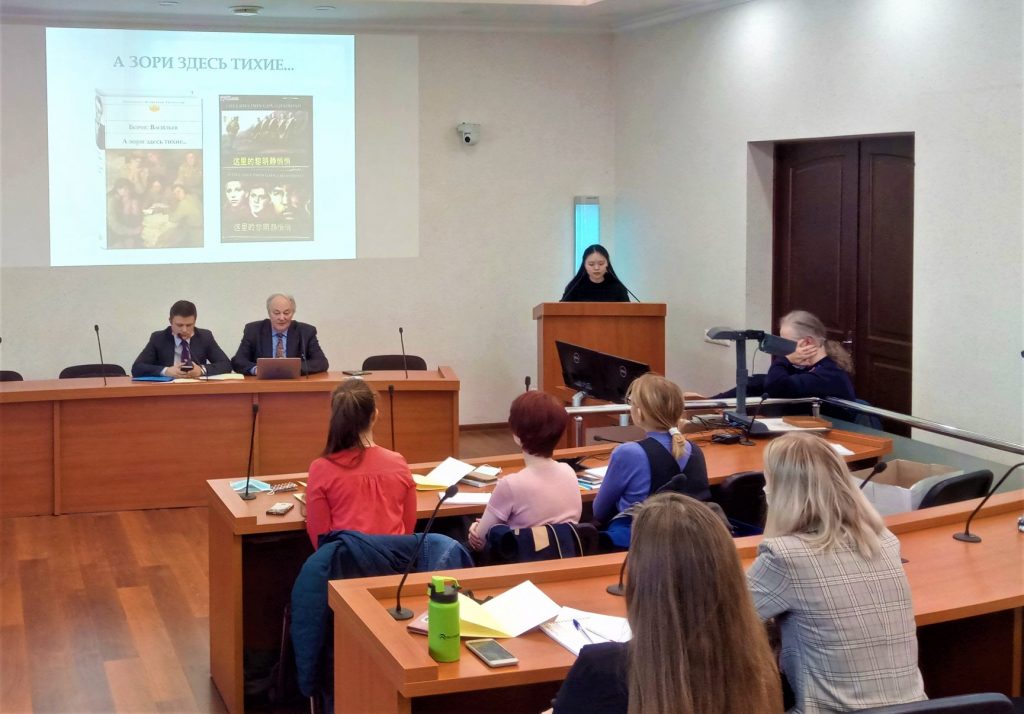The Conference was organized by the Ministry of Education and Science of the Perm Territory, Perm State National Research University (PSU), Perm City Administration, Perm Society for Friendship with China, with a wide participation of students, local sinologists and orientalists. The first day was also marked by informal reports on Chinese ‘footprints’ in Perm history, as well as a real tea ceremony, a workshop in calligraphy and classes of Chinese language.
The conference was opened by Sergey Sanakoev, Deputy Chairman of the Russian-Chinese Friendship Society, President of the Asian Pacific Region (APR) Research Center, Head of the Russian-Chinese Analytical Center. In his opening speech, Sergei Sanakoev provided a brief yet deep review of the Russian-Chinese relations in the new era, observing the key issues of modern politics, economics and healthcare.
Dmitry Ivanov, Head of International Relations Department, Department of Protocol and International Relations of the Government Office of the Perm Territory, spoke about the development of partnerships between Perm region and Chinese provinces, Jiangxi and Anhui, in particular. Dmitry Ivanov mentioned the growing exchange of business contacts following annual reciprocal visits.
According to Boris Kondakov, Dean of the Faculty of Philology, “the main purpose of the conference was to discuss topical issues of teaching Chinese language and culture, locally – expanding academic and cultural ties between China and the Perm Territory. Moreover, in 2020, the Conference has become an attraction for sinologists from Komsomolsk-on-Amur, Yekaterinburg, Kazan and Moscow. “

“The anniversary serves a summing up mark of the work done earlier – forming a good practice and showing prospects for future activity,” says Mikhail Kamenskikh, Associate Professor of the Department of Theoretical and Applied Linguistics, Faculty of Philology of PSU, Chairman of the Perm Society Friendship with China. – In 2020, the conference for the first time stepped outside one university. With a recognition and support by the local authorities, we managed to invite scholars from other cities of Russia, as well as attract Chinese participants for participation. ” Vadim Gataulin, Head of PSU International Department of Perm State National Research University, spoke about the strategy for developing relations with Chinese universities, stressing the fruitful cooperation with Shandong University (山東 大學, Jinan Province, China). The majority of international students come to Perm University from China. Here, the Chinese traditionally study Russian as a foreign language, as well as the history of Russian culture and literature.
Vadim Gataulin emphasized that the number of students enrolled in graduate and post-graduate program is increasing. New linguistic programs will be implemented by PSU Faculty of Philology in the 2020/21 academic year. The inclusion of the exact sciences in the list of disciplines studied, as well as teaching in English will give a new vector in the development of relations between Perm State National Research University and Chinese universities.
Philology served the connecting thread for the Conference. In their reports, Russian researchers concentrated on linguistic approach, psycholinguistic experiments and building vocabularies. Some reports considered cultural phenomena, to mention tea traditions, vision of nature and poetry. Chinese students proved to be interested in Russian literature, while some pieces of writing had been connected to Harbin and Shanghai emigration.
Song Tianyao, PhD student at the Faculty of Philology, PSU, admits that the military theme in art helps her better understand both the Russian and recognize the common human value of life. “My interest in the military theme woke up since childhood, after watching Soviet films,” recalls Song Tianyao. “There were several wars in the history of China in the 20th century: the Anti-Japanese (aka World War II), campaign, the military conflicts during the Cultural Revolution, and the Sino-Vietnamese war… So, as the military theme somehow responds our minds and memories, we tend to value those best examples of the war literature, of which the Soviet and Russian are the best. “As a reminder, in summer 2020 PSU signed two new agreements on the implementation of the double degree program with Shandong Agricultural University and Shandong first Medical University. It is noteworthy that this interaction goes beyond the usual exchanges: “In addition to academic exchange programs, students from China come to study with us on a contract basis, which opens up new opportunities for us,” Vadim Gataulin, Head of PSU International Department, comments.
Further contacts with the Shandong Agricultural University, according to the forecasts of the PSU Department of International Relations, will make it possible to obtain international certification at the Ministry of Education. People’s Republic of China. Note that in July 2020, the official opening of a Service Center for applicants took place in Shandong (China), which is a political, economic, cultural, technological, educational and financial center and transportation hub of the province.


